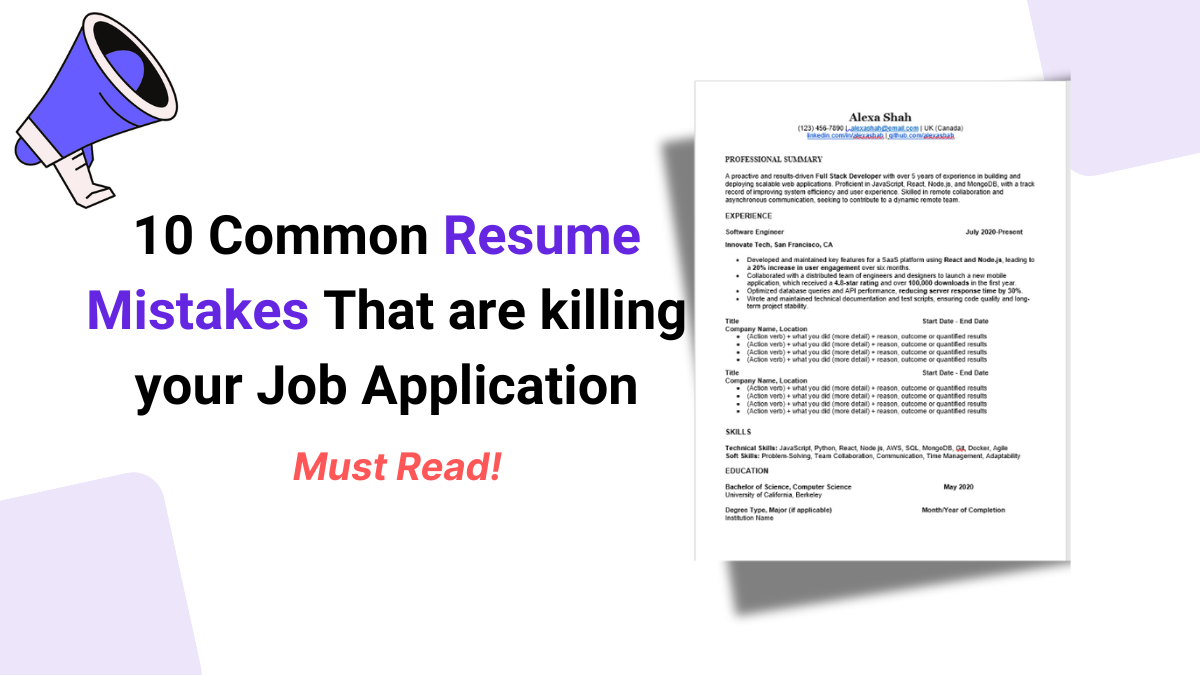Landing a job today isn’t just about having the right skills, it’s also about how well you present them on your resume. The truth is, even highly qualified candidates often miss out on opportunities because of small but costly resume mistakes.
If you’ve been sending applications and not hearing back, your resume could be the reason. In this blog, we’ll walk through 10 common resume mistakes that might be costing you job offers, and how to fix them so you can stand out to recruiters and hiring managers.
Table of Content
Toggle1. Using the Same Resume for Every Job
One of the biggest mistakes job seekers make is sending the same generic resume to every company. Employers want to see why you’re a fit for their role.
Fix it: Customize your resume for each job by tailoring your skills, achievements, and keywords to match the job description.
2. Ignoring Keywords from the Job Posting
Most companies use Applicant Tracking Systems (ATS) to filter resumes. If your resume doesn’t include the right keywords, it may never reach a human recruiter.
Fix it: Carefully scan the job posting and add relevant keywords naturally. For example, if the listing mentions “project management” or “SEO strategy,” make sure those phrases appear in your resume if they apply to you.
3. Writing a Weak Resume Summary
A resume summary is the first thing employers notice. A vague or overly generic one can make them lose interest quickly.
Fix it: Write a strong, personalized summary that highlights your biggest achievements and career goals in 2–3 sentences.
4. Overloading with Unnecessary Details
Including irrelevant experiences, every certification you’ve ever earned, or unrelated hobbies can clutter your resume.
Fix it: Focus only on experiences that align with the job you’re applying for. Keep your resume concise and results-driven.
5. Poor Formatting and Design
A resume that’s hard to read will be skipped, even if you’re highly qualified. Fonts that are too fancy, lack of white space, or inconsistent formatting can hurt your chances.
Fix it: Use a clean, professional format. Stick to readable fonts like Arial or Calibri and keep section headings clear. If you’re not sure which format to use, check out our guide on how to write a chronological resume for a structured approach. (Insert internal link here)
6. Not Quantifying Achievements
Saying “responsible for managing projects” doesn’t tell much. Recruiters want to see impact.
Fix it: Use numbers, percentages, or measurable results. For example: “Increased website traffic by 40% in six months through targeted SEO campaigns.”
7. Typos and Grammar Mistakes
This might sound obvious, but you’d be surprised how often typos or grammar errors slip into resumes. These mistakes show a lack of attention to detail.
Fix it: Proofread your resume multiple times. Use tools like Grammarly and ask a friend or mentor to review it.
8. Making It Too Long (or Too Short)
A resume that’s three pages long is overwhelming, but a one-page resume with no substance isn’t better either.
Fix it: For most job seekers, keep it to one page if you’re early in your career, or two pages if you have more than 7–10 years of experience.
9. Forgetting Contact Information
You’d be shocked how many candidates leave out phone numbers, email addresses, or LinkedIn profiles.
Fix it: Always include updated contact information at the top of your resume.
10. Skipping a Cover Letter
While not always required, skipping a cover letter when you have the chance can hurt your chances of standing out.
Fix it: Write a tailored cover letter that complements your resume and highlights why you’re the best fit for the role.
Final Thoughts
Your resume is your first impression, and small mistakes can cost you big opportunities. By avoiding these 10 resume mistakes, you’ll increase your chances of landing interviews and job offers.
If you’re still unsure about which resume format to use, check out our blog on how to write a chronological resume. It’s a great place to start if you want a simple and professional structure.
Free download Resume Template
FAQs on Resume Mistakes
- What are the most common resume mistakes?
Generic resumes, poor formatting, typos, and missing keywords are the most common mistakes. - Can a resume have too much information?
Yes. Overloading with irrelevant details makes your resume harder to read and less effective. - How do I make my resume stand out to employers?
Tailor it to each job, use strong action verbs, and highlight measurable results. - Should I use the same resume for every job?
No. Always customize your resume with skills and keywords that match the job description. - Do hiring managers care about resume format?
Absolutely. A clean, easy-to-read format helps recruiters quickly spot your strengths.
